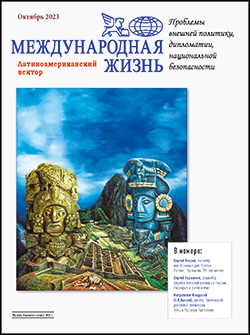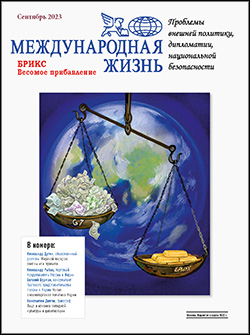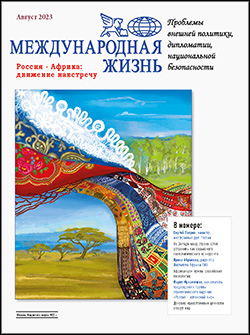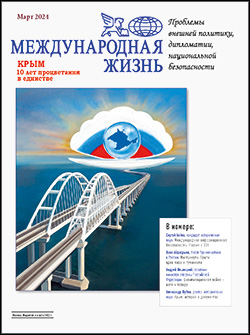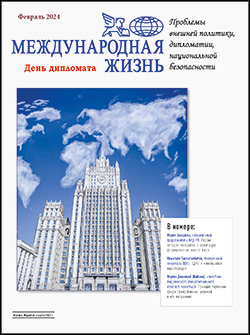Sergei Lavrov, the Russian foreign minister
Speech at the First Forum of Young Diplomats
On April 24th-25th, the First Forum of Young Diplomats from the CIS countries, Abkhazia and South Ossetia, was hosted in Moscow, during which there were interesting discussions. Such meetings will be held regularly and will be a useful platform for young professionals to discuss topical issues of international life and the regional agenda. The participants had the opportunity to meet with their younger colleagues, and also with well-known Russian experts in the field of international relations, and Russian diplomats and authoritative figures of recognized ability in foreign policy. On the sidelines of the forum, the current political and economic issues of international relations were discussed, such as the future of the Customs Union, the formation of the Common Economic Space, the events in Ukraine, and other current contemporary issues.
POLITICS
A. Budaev. "Soft power" in Brazil’s foreign policy
The meaning of "soft power", which is considered to be one of the weapons in the arsenals of the major world powers, has been more and more adopted in recent years by the Brazilian political elite, and it stresses the importance of the application of this factor in order to promote national priorities at the global and regional levels.
Dr. Riad Haddad. Russia and Syria are bound by special historical relations.
The Syrian leadership has called for, and continues to call for a political solution to the crisis through a comprehensive national dialogue involving all representatives of Syrian society. In 2013 President Bashar al-Assad put forward a plan to address the Syrian crisis and the transition to a new Syria without external interference. This approach was also voiced at the Geneva Conference.
UKRAINIAN VECTOR
Y. Bulatov. Russia and Ukraine: together or apart?
In 1654, The Ukraine consisted of only 1/6th of its present territory and 5/6th of its land was down to Russia, and later, the Soviet Union, which added to its composition in the following centuries. Today, if we consider Russia as a Eurasian state, Ukraine is the largest country in Europe in terms of its area, and this is not despite of but rather because of Russia.
A. Moiseev. Several international legal positions regarding the Ukrainian issue.
In accordance with international law, The Russian Federation took advantage of their natural rights to recognize a state, as well as by international treaty. The result of this, with the mutual consent of all parties, was the appearance of two new parts to the composition of the Russian Federation: The Republic of Crimea and the Federal City of Sevastopol.
D. Danilov. NATO: Forward to the past.
The Ukrainian crisis forces NATO not only adjust their plans, but their goals themselves, which have primarily oriented the alliance. Such decisions must be agreed at fairly short notice, in order to submit them for consideration and approval at the summit in Wales, which will take place on September 4th and 5th 2014, and which "will shape the future of the alliance."
D. Babich. How and why neo-Nazi ideas became "Mainstream" in Ukraine.
Today in Ukraine, we have witnessed a change in the strategy of the West in the struggle for influence in the territory of the former Soviet Union, and the immediate failure of this very latest strategy.
TRENDS
O. Karpovich. The global problems of international relations in the context of the emerging multipolar world.
The current political reality is one of more and more recognized global political instability, in which the world has passed through the erosion of the Westphalian system. The system of international relations is becoming increasingly anarchic. There is a growing crisis in the concept of a "democratic world" - a pivotal concept in an era of unipolarity.
I. Klassen. A new course in German foreign policy.
At the anniversary of the 50th Munich Conference on Security Policy, the new ruling coalition vaguely hinted at a significant evolutionary shift in German foreign policy. As the German Foreign Minister Frank-Walter Steinmeier stated, the future of the country’s foreign policy should be to respond in a "prompt, meaningful and decisive manner" to what is happening in the world today.
The Russian Foreign Ministry
Vladimir Petrovsky: Russian diplomat and citizen of the world.
At a meeting of colleagues, friends, and students, recollections were shared about this outstanding Russian diplomat. During the meeting, speeches were read out to those attending, including Vladimir Petrovsky’s family, by Russian Foreign Minister Sergei Lavrov, and UN Secretary-General (from 1997-2006) Kofi Annan.
MILESTONES IN HISTORY
D. Safonov. Inside the lair of the defeated beast.
Immediately after the war, the Soviet leadership decided to send a special team to Germany, for a thorough analysis of technological innovations found there that could be possibly transferable for use, for which the Germans have always been famous for. This team consisted of fifty people. It consisted mainly of representatives from the Academy of Sciences, universities and some commissariats with a technical background.
M. Konarovsky. The Mostufi homestead.
In the Afghanistan proclamation of independence in 1919, the first nation to welcome Afghanistan was Soviet Russia. After the signing of the bilateral political agreement with Kabul 1921, Persia and Turkey did the same. In this regard, in Kabul among Turkish and Iranian diplomats there is still the believe in the version that the Afghan Emir, the reformer Amanullah Khan, allegedly welcomed Moscow, Ankara and Tehran, and offered to them a territory for their embassies in the park complex next to the Royal Palace complex.
BOOKS AND REVIEWS
Metropolitan Kliment (G. M. Kapalin). "It is our belief, and it is Russian."
N. Efimov. Strategic stability in world politics: the formulas of the academic Kokoshin
A. Zaitsev. Establishing new pages in the history of diplomatic relations with Iceland.
Читайте другие материалы журнала «Международная жизнь» на нашем канале Яндекс.Дзен.
Подписывайтесь на наш Telegram – канал: https://t.me/interaffairs

 19:12 24.05.2014 •
19:12 24.05.2014 • 